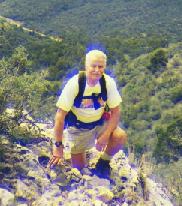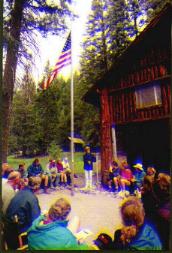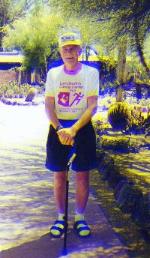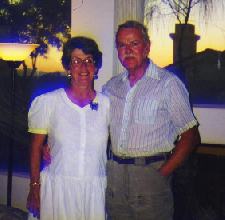Marathon Man Prepares for the Race of His Life
Since 1989, David and Sandy have been summer caretakers of a unique California relic: the historic Hodges Cabin in the Trinity Alps Wilderness, near Coffee Creek. They've volunteered their time to the U.S. Forest Service. In their words, it's been "a labor of love." (At about $1.00 per hour, it hasn't been the money). They stay from June to September and come as close to "living off the land" as Henry David Thoreau did on Walden Pond.
Imagine the routine. In June, they park their old Ford pickup truck at the trail head, hoist packs of food on their backs, and hike four miles (and a 1200 foot rise in elevation) to the Cabin. At the cabin, they play host to as many as 350 hikers who are either visiting the cabin, passing through or flat out lost. David recalled: "We've fed people and believe it or not we've clothed people. We've had people come over the mountain and say `Where are we?'" For David, there is no greater joy than hiking those mountains. In 1996, he made the four mile trek from the trail head to the cabin 64 times -- when he was seventy-two years old!
David is no stranger to adversity. He proudly served in the U.S. Navy for thirty years, and fought in three wars. At the age of sixty, when most of his peers were settling down in front of the television or fireplace, David took up marathon running. He has run in over twenty-five marathons.

In 1989, a local runners club started holding a road race in David' s honor. the race is 22 miles:in David'"/images/patient-stories/davidp1.jpg" style="width:162px; height:301px; float:left">
In January, David made another appointment with his primary care physician. A chest x-ray revealed fluid in the area of the right lung. A thoracentesis was performed, but the cytology was negative for cancer. The working diagnosis was heart failure. The doctors performed a battery of tests, including a flex sigmoidoscopy, but could find no explanation for the fluid. David returned home. David and Sandy had always been very self-reliant. Now they were forced to put their trust in the hands of the medical experts.
In February, the pain and the fluid returned. A CT scan confirmed a pleural effusion. David was referred to a thoracic surgeon. The doctor recommended that a thoracoscopy be performed to determine the diagnosis. The new working diagnosis was lung cancer. David and Sandy arrived at the hospital on the evening of February 23rd to prepare for surgery the next morning. On the morning of the 24th, however, they were informed that the hospital did not have any beds available. The hospital staff asked them to return the next day.
On February 25th, they were again advised that there was no room in the hospital. On the 26th, they reported to the hospital at 5:30 a.m. to prepare for a scheduled 7 a.m. surgery. David waited anxiously on the gurney for the next four hours. The doctor finally arrived at 11 a.m. The wait was exhausting and nerve-wracking.
A right thoracoscopy, a pleural biopsy and a talc pleurodesis was performed. The surgeon removed 3.5 liters of fluid. A chest tube was also inserted, because David's lung had collapsed. The tissue specimens were analyzed and the diagnosis was malignant pleural mesothelioma.
David remained in the Critical Care Unit for several days. The fluid returned to his pleural cavity and another talc pleurodesis was done. On March 2nd, he was transferred to the intermediate cardiac care unit. He remained on oxygen and was heavily medicated.
David is a strong man with a healthy sense of humor, but this sudden illness tested his resolve. Laying in the hospital with tubes running in and out of his body, pure oxygen pumping down to his lungs, the constant humming and beeping of machinery, David was far away from the peace and quiet of Hodges Cabin and the pristine beauty of the Grand Canyon. In order to survive from minute to minute, he would mentally transport himself back to the tranquillity of the woods and canyons. He says he would have given anything to be able to get up out of that hospital bed and start up the trail to Hodges Cabin. "I don't mind the right kind of pain, like the pain you feel in your legs after hiking for 20 miles through the wilderness."
On March 3rd, his chest tube was removed. He was discharged on March 7th and returned to his home. Unfortunately, his family physician and local oncologist were not familiar with the disease and did not offer any viable treatment options. The local doctors failed to prescribe antibiotics after the surgery and David developed pneumonia.
David then consulted with a "big-city" oncologist but, like his hometown doctors, the big city oncologist did not recommend any treatments. The family decided to design their own treatment plan. They asked David to name the program, and with characteristic humor, this is what he came up with: "The Superchallenge Program for El Veijo Cerrote." Loosely translated, "The Superchallenge Program for the Smelly Old Fart."
The program is composed of several parts, as follows:
1. Pray at the start of each day.
- Give thanks for each day and ask for guidance.
2. Deep Breathing exercises.
- A set of 10 deep breaths three times a day. Inhale for a count of one, hold for a count of four, exhale for a count of two.
3. Take Vitamin C.
- At least 10 grams a day, spread out evenly over the day.
4. Take other vitamins.
- Vitamin E; Niacin (Vitamin B3); B Vitamins; Selenium (0.2 mg)
5. Eat plenty of carrots and tomatoes, at least one serving a day.
6. Drink at least eight, 12-ounce glasses of water a day.
7. Listen to Tapes.
- Subliminal tapes.
- Self-esteem tapes.
- Relaxation tapes.
8. Exercise
- Walk every day if possible, re-setting your goals.
- Carry weights when you walk, working on upper body strength.
- Work around the house and in the garden/yard when possible.
9. Use Humor as a Tool.
- Find excuses to laugh.
- Watch funny movies. Read funny stories or comics.
10. Protect yourself from Negativity.
- Avoid bad news in the media.
- Avoid negative topics of discussion.
- Avoid negative people.
11. Read books about healing.
- Develop a reading program, perhaps reading aloud.
12. Use positive imagery.
- Imagine the Vitamin C at work, healing your body.
- Picture yourself hiking, biking, running, or doing any other physical activity you love.
13. Reach out to others.
- Go to a cancer support group.
- Go to church.
- Help others in need.
David is blessed with a very smart, compassionate and loving family who are rallying to help him get through this nightmare. As of this writing, David and Sandy are interviewing surgical oncologists on the West Coast about his candidacy for an aggressive multi-modal treatment plan. David was exposed to asbestos while serving in the U.S. Navy for many years.

David and Sandy were recently featured in a newspaper story in Northern California. The reporter said it best when he described David in the following manner: "He's a blur of movement. That's why the hammock came down. It set there for two years, but David couldn't find a use for it. `I laid in it a couple of times, for a couple of minutes,' he said. `But just for a couple of minutes. Then I'd think of something to do.'"
One of the things David enjoyed doing was searching for gold in Coffee Creek. According to family lore, he knows where it's buried, but he's keeping the precise whereabouts hidden for now. In the eyes of his family and his friends, David carries with him wherever he goes the most valuable treasure in the world: a heart of gold.
He and Sandy are eager to talk to others who are facing this challenge. They can be contacted through this office.
** POSTED JUNE 26, 1998 **
Dear Roger,
Hodges Cabin was more beautiful than ever this summer and my little memorial service for David was attended by 26 family and friends who trudged up the trail to say "hello and goodbye."
Here is a picture of our "ring around the flag pole" yesterday. I also have one of David taken two weeks before his death....his radiance is still there.
Love,
Sandy
* * * * * * * * * * * *

David Pickens passed away on May 15, 1999 at the age of seventy-five. He chose to live his life without chemotherapy, radiation or surgery. Some people are so full of life and joy they don't really die. This was David Pickens. A giant Redwood of a man. RGW
** POSTED SEPTEMBER 29, 1999 **


